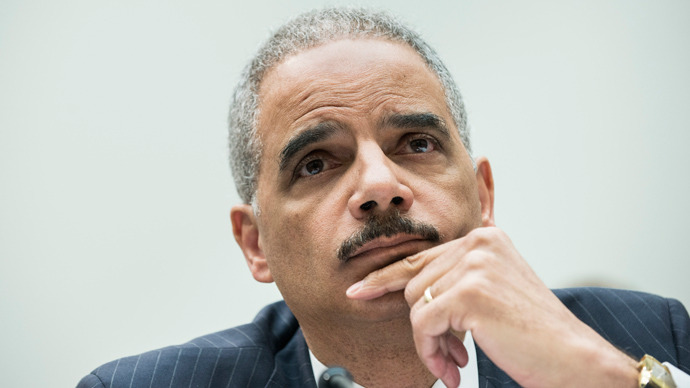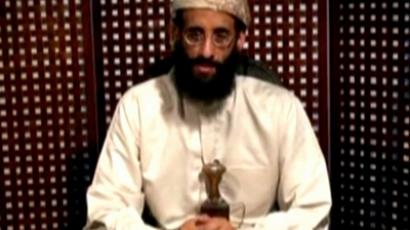US government admits to killing four American citizens with drones

United States Attorney General Eric Holder has informed Congress that four American citizens have been killed in Yemen and Pakistan by US drones since 2009.
It has been widely reported but rarely acknowledged in Washington that three US citizens — Samir Khan, Anwar al-Awlaki and his teenage son, Abdulrahman al-Awlaki — were executed in Yemen by missile-equipped drones in 2011. With Holder’s latest admission, however, a fourth American — Jude Kenan Mohammed — has also been officially named as another casualty in America’s continuing drone war.
“Since 2009, the United States, in the conduct of US counterterrorism operations against al-Qaeda and its associated forces outside of areas of active hostilities, has specifically targeted and killed one US citizen, Anwar al-Awlaki,” the letter reads in part. “The United States is further aware of three other US citizens who have been killed in such US counterterrorism operations over that same time period,” Holder said before naming the other victims.
“These individuals were not specifically targeted by the United States,” the attorney general wrote.
The news of the admission broke Wednesday afternoon when New York Times reporter Charlie Savage published the letter sent from Holder to congressional leaders in a clear attempt to counter critics who have challenged the White House for falling short of US President Barack Obama’s campaign plans of utmost transparency. Upon a growing number of executive branch scandals worsened by the Department of Justice’s recently disclosed investigation of Associated Press journalists, Holder wrote that coming clean is an effort to include the American public in a discussion all too often conducted in the shadows cast by the US intelligence community.

“The administration is determined to continue these extensive outreach efforts to communicate with the American people,” continued Holder. “To this end, the president has directed me to disclose certain information that until now has been properly classified. You and other members of your committee have on numerous occasions expressed a particular interest in the administration’s use of lethal force against US citizens. In light of this fact, I am writing to disclose to you certain information about the number of US citizens who have been killed by US counterterrorism operations outside of areas of active hostilities.”
The letter, dated Wednesday, May 22, was addressed to Sen. Patrick Leahy (D-Vermont) and the Senate Judiciary Committee.
Drone strikes have become a signature counterterrorism tool used by the Obama administration and his predecessor, President George W. Bush, and have been attributed with killing roughly 5,000 persons abroad, according to Sen. Lindsey Graham (R-South Carolina). But under the covert and protective umbrella of the Central Intelligence Agency, little has been formally acknowledged from Washington as to the details of these strikes.
As part of the vaguely defined ‘War on Terror,’ the US has reportedly waged drone strikes outside of Afghanistan where the Taliban once harbored al-Qaeda. In recent years, those strikes have targeted towns in neighboring Pakistan, as well as Yemen, Somalia and perhaps elsewhere.
But despite growing criticism over escalating use of drones, the president and his office has remained adamant about defending the operations.
“It’s important for everybody to understand that this thing is kept on a very tight leash,” Obama said last January, adding that his administration does not conduct "a whole bunch of strikes willy-nilly.”
Others have argued quite the opposite, though, and have opposed these drone strikes over the lack of due process involved and the habit of accidently executing civilians in the strikes. When researchers at Stanford University and New York University published their ‘Living Under Drones’ report last September, they found that roughly 2 percent of drone casualties are of top militant leaders. The Pakistani Interior Minister has said that around 80 percent of drone deaths in his country were suffered by civilians.
Earlier this year, Sen. Rand Paul (R-Kentucky) led a marathon filibuster on the floor of Congress to oppose the CIA’s drone program and demand the administration explain to elected lawmakers why the use of unmanned aerial vehicles is warranted in executing suspects, often killing innocent civilians as a result.

Of particular concern, Paul said, was whether or not the Obama administration would use the 2011 Yemen strike as justification to kill American citizens within the US. For 13 hours, he demanded the White House respond.
“I rise today to begin to filibuster John Brennan’s nomination for the CIA,” Sen. Paul said. “I will speak until I can no longer speak. I will speak as long as it takes, until the alarm is sounded from coast to coast that our Constitution is important, that your rights to trial by jury are precious, that no American should be killed by a drone on American soil without first being charged with a crime, without first being found to be guilty by a court.”
One day after the filibuster, both Attorney General Holder and White House Press Secretary Jay Carney reached out to Sen. Paul to say the president lacks the authority to issue such a strike within the US. With this week’s letter, however, Holder admits that at least four Americans have met their demise due to US drones. He also explains why the administration felt justified in using UAVs to execute its own people.
“Al-Awlaki repeatedly made clear his intent to attack US persons and his hope that these attacks would take American lives,” wrote Holder. “Based on this information, high-level US government officials appropriately concluded that al-Awlaki posed a continuing and imminent threat of violent attack against the United States.”
Later, Holder says the decision to strike al-Awlaki was “not taken lightly” and was first put into plan in early 2010. Additionally, Holder said the plan was “subjected to exceptionally rigorous interagency legal review” and that Justice Department lawyers and attorneys for other agencies agreed that it was the appropriate action to take.
According to Holder, the senior al-Awlaki and Mr. Khan were killed in the same September 2011 drone strike in Yemen. The following month, 16-year-old Abdulrahman Anwar Al-Awlaki was killed in a strike in the same country. Mohammed, a North Carolina resident born in 1988, was killed by a drone likely in November 2011 within a tribal area of Pakistan. Mohammed was indicted by a federal grand jury in 2009 for conspiracy to provide material support to terrorists and conspiracy to murder, kidnap, maim and injure persons in a foreign country, and was considered armed and dangerous by the Federal Bureau of Investigation. Both Khan and the older al-Awlaki were suspected members of al-Qaeda and were affiliated with the group’s magazine, Inspire.
Last February, friends of Mohammad told a North Carolina newspaper that they believed he was dead.
“Farhan Mohammed says he heard in November that his friend was killed in a drone strike,” Raleigh’s WRAL News reported in 2012. “Jude Mohammad’s pregnant wife was hysterical about her husband's death and called her mother-in-law in the Triangle to break the news, according to Sabra. The US government hasn't confirmed Mohammad’s death, but the people who knew him in North Carolina say it's probably true.”
Holder declined to explain why either Mohammad or the teenage al-Awlaki were killed. President Obama is expected to discuss America’s drone program at an address in Washington on Thursday.














